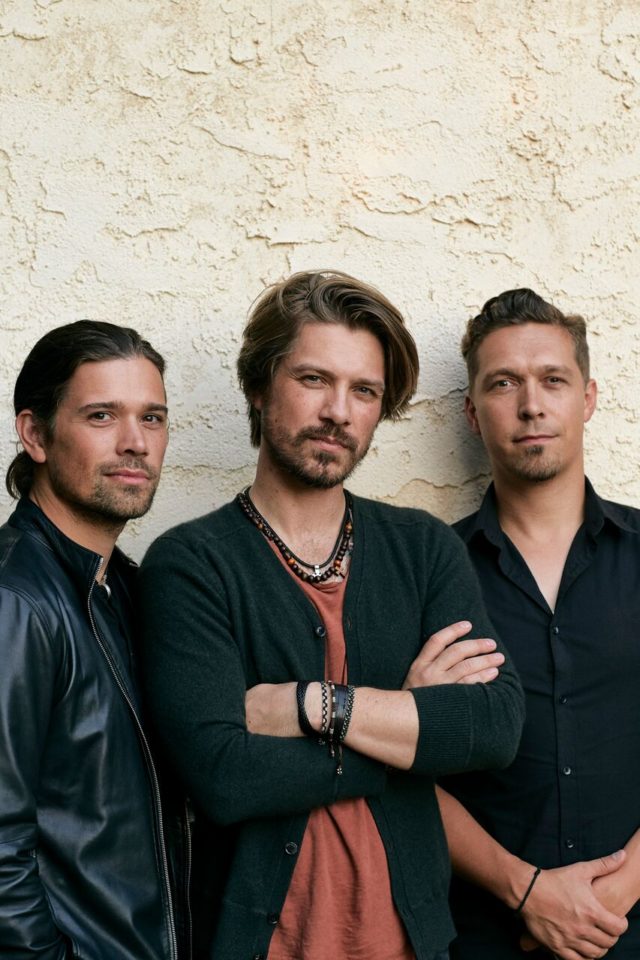
In a way, Hanson has been laying the foundation for their upcoming orchestrally driven album, String Theory, since the “MMMBop” days.
That was 21 years ago, by the way — but who’s counting?
Well, Hanson, for one.
The three brothers from Tulsa, Oklahoma — Isaac, Taylor and Zac — just celebrated their 25th anniversary as a band last year with a world tour and a greatest hits album. But the real pièce de résistance was yet to come: the trio had already begun working with Academy Award-winning composer David Campbell to reimagine some of the band’s back catalog of music, as well as some new tracks, into a symphonic narrative they planned to take back out on the road and package as an album.
Guitarist and elder Hanson, Isaac, calls String Theory a “bucket list thing.”
“David was always the first person on the list for us,” he says. “At first we weren’t even sure he’d want to do it — it’s a lot of work. Our relationship with him had been very positive but relatively limited.”
Campbell — whose orchestration can be heard on albums by Adele, Justin Timberlake and Michael Jackson, not to mention countless feature films — composed the string arrangements for several tracks on Hanson’s 1997 major label debut, Middle of Nowhere, a record that spawned five consecutive Top 40 singles on the Billboard charts. He worked with the trio again on their 2000 release, This Time Around.
Nearly 20 years after their last collaboration, Hanson called Campbell up and pitched him their idea for String Theory.
“It’s basically an aspirational story of a character going from a child to an adult, from optimism and youthful enthusiasm to the struggle that inevitably happens as we grow, the conversion from ‘do I give up or fight for the dream,’” Isaac says.
Campbell was sold. Now, after two years of planning and work, the band launched the String Theory tour in early August. On Sept. 8, they’ll join members of the Colorado Symphony for a show at Bottecher Concert Hall in Denver.
“We want to make this as much as possible about the orchestra,” Isaac says. “We’re going to make many, many moments throughout the show where the orchestra is up front and center. If we’re gonna do this, what’s the point in playing with 45, 50, 60, 90 people and not letting them do their jobs?”
Like their catalog of music as a whole, String Theory, Isaac says, is based on optimism in the face of adversity.
“I actually think in many ways our music is more pessimistic than people think it is,” he says. “When you think of a song like ‘MMMBop,’ people think sunshine and rainbows. That song comes from a deep personal realization that the joy you’re pursuing comes with sacrifice. Even though it’s a pop song it has this clear thread in it, at least lyrically speaking. What’s fun about [the String Theory] show is it draws out some of the melancholy in ‘MMMBop’ without betraying what that song is, which is really important.”
The band isn’t self-conscious about their breakthrough hit, a classically saccharine-sounding pop song that fully embodies the term “ear worm.” The lyrics, perennially mis-heard, revolve around the ever-changing relationships that come and go throughout the seasons of a person’s life.
It’s fairly mature subject matter for a trio of, at the time, basically prepubescent boys. Add to that the fact that they wrote and played their own music during the hey-day of pop powerhouses like Britney Spears, N*Sync and the Backstreet Boys who had teams of writers behind their songs, which were then taken to arenas where they were performed alongside in-depth choreographed stage shows.
The Hanson brothers — along with their four younger siblings — grew up listening to music from the ’50s, ’60s and ’70s, and the influence is unmistakable in the concise blends of pop, gospel, rock and soul found on each of their six studio albums.
They never left Tulsa for greener musical pastures in Los Angeles, preferring to go home after tours to the friends they grew up with and the town that raised them. They survived the capsizing of the record industry by creating their own imprint in 2003, 3CG Records, which they still run and release through today. They’ve led philanthropic missions to raise awareness around poverty and AIDS across Africa, developed their own craft beer (MMMHops) and founded a successful music and beer festival in Tulsa.
Today, all three are happily married with 12 children between them.
Everything with Hanson, from their family lives to their careers, has been about the long-term strategy.
“Here’s the thing: fame is not the goal,” Isaac says. “There’s always this balance, this push and pull of fame and artistic integrity you’re trying to balance.
“I like being able to live a relatively normal existence but I also really appreciate and respect how hard it is and how lucky it is to have fans who are as enthusiastic as our fans have been for the last 25 years.”
On the Bill: Hanson: String Theory — with the Colorado Symphony. 7:30 p.m. Saturday, Sept. 8, Boettcher Concert Hall, 1000 14th St., Unit 15, Denver, tickets.coloradosymphony.org.














